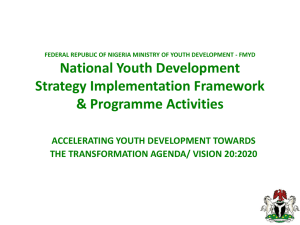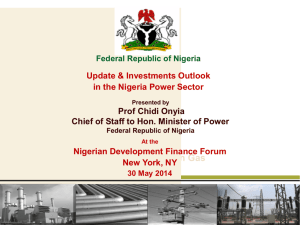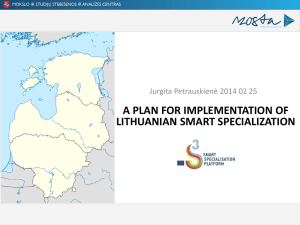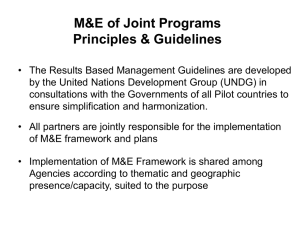Power Sector Reforms
advertisement
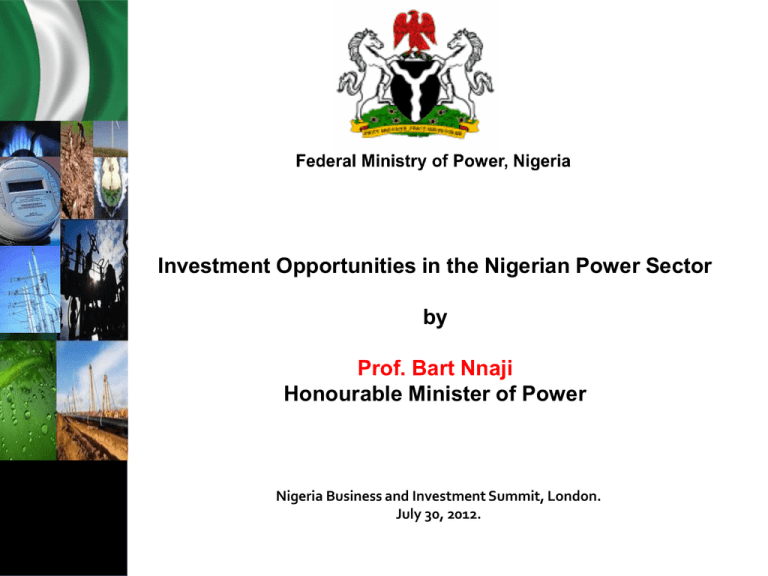
Investment Opportunities in the Nigerian Power Sector by Prof. Bart Nnaji Honourable Minister of Power Nigeria Business and Investment Summit, London. July 30, 2012. The Federal Government of Nigeria has a “Vision 20-2020”: 40,000MW of power by the year 2020 Current installed capacity of 8,425MW is 20% of vision target Available capacity is only about 50% of installed capacity Massive expansion in generation, transmission and distribution infrastructure (US$100b in 10 years) needed Generation alone requires over $3.5billion/year for the next 8 years Government is unable to fund and manage this requirement. Hence, the decision to reform the sector Federal Ministry of Power 2 Nigeria needs to dramatically increase its power generation to unlock the country’s full economic potential Power generation installed capacity kW / thousand inhabitants ▪ To achieve Brazil GDP per capita level by 2030 (i.e., $10,000), we will need 135GW1 of capacity to supply a projected 230m Nigerians ▪ This is a 15 times capacity increase from today ▪ It also means we need to build power plants at 7 GW/year for the next 18 years. 530 270 190 120 145 40 Nigeria Indonesia India Morocco South Africa Brazil 1 Capacity estimate based on consumption per capita average of Brazil and South Africa and with capacity utilization of 70% Federal Ministry of Power 3 Monopoly of the Nigerian Power Sector – Single authority National Electric Power Authority (NEPA) was in place up until 2005 Inefficient management of power supply systems High technical and non-technical losses in the power system Corrupt public-owned and public-managed power sector Obsolete and inefficient power infrastructure owing to little or no maintenance Minimal investment in power Low tariff rates with low collection rates Federal Ministry of Power 4 Nigeria had one of the lowest low tariff levels in Sub-Saharan Africa making it uncompetitive for private sector participation. A new cost reflective tariff commenced June 1, 2012 to enable investors recover cost and push the tariff level to an average model Federal Ministry of Power 5 The objective is to reform the sector and introduce private sector participation; Creation of an independent sector regulator – Nigerian Electricity Regulatory Commission (NERC) Creation of a initial holding company (Power Holding Company of Nigeria) for the NEPA assets and liabilities Unbundling of PHCN into successor companies - 6 generating companies, 11 distribution companies, 1 transmission company, 2 special purpose entities: a liability management company and a bulk trader Privatization of generation and distribution companies Licensing of new entrants into the generation space Federal Ministry of Power 6 Tight coupling of the entire value-chain Incentivizing each link in the value-chain to provide support to all others and motivate them to deliver on expectations Fuel Fuel Transport Power Generation Transmission Distribution Consumers Close monitoring of all projects and performance along the value-chain Targeting critical changes in ownership and control of the sector Federal Ministry of Power 7 Current Configuration Gas Production Gas Transmission Power Production Power Transmission Power Distribution Ownership Mixed FGN Largely FGN FGN FGN Operational Control Largely Private FGN Largely FGN FGN FGN Required Configuration Gas Production Gas Transmission Power Production Power Transmission Power Distribution Ownership Mixed Mixed Largely Private FGN Fully Private Operational Control Largely Private Largely Private Fully Private Fully Private Fully Private Long Term Goals The Nigerian power market to have reached stability for willing-buyer, willing-seller mode To ensure that all aspects and stakeholders of the NESI are working together to deliver quality, reliable and efficient electricity to consumers at reasonable prices Federal Ministry of Power 8 Power Sector Reform Roadmap was launched by President Goodluck Jonathan in August 2010: The Roadmap lays a definite plan setting timetable and guidelines for the implementation of the EPSR Act of 2005 Reconstitute and strengthen the Nigerian Electricity Regulatory Commission (NERC) Establish the Nigeria Bulk Electricity Trading Company (Bulk Trader) as a credit-worthy off-taker Resuscitate the erstwhile comatose Rural Electrification Agency (REA) Develop and implement a cost reflective tariffs. June 1st 2012 the revised tariff, Multi-Year Tariff Order 2, took effect. Fast-track the privatization programme Federal Ministry of Power 9 Privatization of generation/distribution companies in progress: Hydro Power Plants Thermal Power Plants - concession - privatization The Transmission Company of Nigeria on July 23, 2012, signed a Management Contract with Manitoba Hydro International of Canada who will be responsible for managing the transmission network and the national grid. Tremendous response from international investors 331 bids submitted, 207 prequalified 25 Bids received for the 6 Generation Companies as at July 17, 2012 Bids for the 11 Distribution Companies are expected on July 31, 2012 Emergence of winning investor groups in 4th Quarter of 2012 Federal Ministry of Power 10 Investor confidence boosted by Executive Political-Will with policy stability and consistency Rule of Law (sanctity of contracts) Regulatory certainty (regulatory independence) Institutional Capacity (Ministries, Departments and Agencies driving the change) Proper project development (Proper feasibility/EIA Studies) Ensuring credit worthiness of market participants (Bulk Trader) Long-term planning Federal Ministry of Power 11 •Initial US$1.5 World Bank Partial Risk Guarantee for power generation •US EXIM Bank has provided an investment window of more than US$1.5BN for investment in the Nigerian Power Sector •US$150 African Development Bank (AfD) •Overseas Private Investment Council (OPIC) Federal Ministry of Power 12 •General Electric MOU •Siemens AG MOU •Daewoo E&C •Eletrobras •EDF/ETDE These companies have all signed Memorandums of Understanding with the Nigerian Government to support Power Projects with a new approach of providing equity in the investment Investors from all over the world have shown commitment and keen interest in Nigeria’s Power sector owing to the clearly defined programme set out by its government -Asia (China, India, South Korea) -Europe (Germany, Nordic Countries, UK) -The Americas (United States, Canada) -Africa -South America (Brazil -Nigeria, etc Federal Ministry of Power 13 The presence of a strong, independent regulator: Nigerian Electricity Regulatory Commission. Institution of a cost reflective tariff effective June 1st 2012 with Major reviews of Multi Year Tariff Order (MYTO) to occur after every 5 years Institutionalization of international best-practice commercial frameworks in Power Purchase Agreements (PPAs), Gas Supply Agreements (GSAs) and Gas Transport Agreements (GTAs) Presence of a credit—worthy off taker for power: Nigeria Bulk Electricity Trading Company Plc (also known as the Bulk Trader) backed by WB Partial Risk Guarantees Federal Ministry of Power 14 Gas Supply/ Transport Tariff Wholesale Tariff for Power Gas Supply/ Transport Bill Wheeling Charge Transmission Bill TuOS Payment Gas Payments PPA Agreement Federal Ministry of Power Retail Tariff for Power Bills Payment of Bills PPA Payment 15 Large potential Electricity Market: About 167 million people, about 50% below 18 years, (and growing!) with about 60% access to grid electricity. An energy hungry population Nigeria has a broad base and abundance of fuel sources: hydro, natural gas, coal, solar and wind Government has set an aggressive target build to increase installed capacity to 40,000MW by year 2020 Gas supply and gas transport to support at least 70% of the new build presents a tremendous opportunity for investors in gas assets Development of Nigeria’s abundant low sulphur coal reserve for power generation is an area for investment Federal Ministry of Power 16 Investment in developing large hydro power as well as small and medium-scale hydro power projects; we have identified 370 sites for development of small hydro projects. Renewable energy portfolio standards to drive generation from renewable sources such as wind, solar and Proposed expansion of the existing 132kv and 330kv power transmission network and development of a 765 KV super grid loop across the country A growing electricity market means an opportunity for the manufacturing of power equipment and components Federal Ministry of Power 17 Development of Emergency and off-grid power projects to serve communities without access to the grid Power related training, management consultancy services and capacity development such as legal, power engineering and financial services It is estimated that an average of US$10b/year will be required for investment in the power sector in order to meet projected targets, this is a big opportunity for investors and financiers. Finally, avoiding the Vodacom Mistake Federal Ministry of Power 18 The reform is expected to lead to Efficient, reliable power supply Job Creation leading to reduction in restiveness and criminality and boost economic growth Lower production costs and more competitive manufacturing sector Reduction of Government expenditure on power provision and subsequent application of funds to to other social needs Empowerment of SMEs and improvement of social and educational services Power is the highway upon which all development must travel on! Federal Ministry of Power 19 Summary of Benefits and Effects of Power Reform Power sustainability, reliability and stability Achieving telecoms’ position: Taking power availability for granted Federal Ministry of Power Fundamental engine for job creation leading to significant reduction in youth restiveness Empowering other economic and social service activities such as call centers, healthcare delivery systems, educational institutions Lowers production cost and makes Nigeria’s manufacturing sector more competitive internationally Rapid growth in power while at the same time significant reduction in FGN’s expenditure Empowering SMEs: welders, hair-dressers/barbers, printing presses, tailors, small food processors, etc. Children in rural areas are able to study at night without using kerosene lanterns or candles. 20 Thank you For more information please visit www.nigeriapowerreform.org Federal Ministry of Power 21

